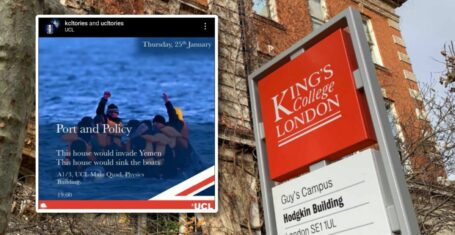
Alpha Epsilon Pi: Frat culture arrives at KCL
Is the American trend set to storm British universities? Sara Kamouni finds out
When you hear the word ‘fraternity’, what comes to mind? American college students, Greek letters and disturbing initiation rituals, perhaps? Probably all of these things, and more… but it’s pretty unlikely that your first thought was of Alpha Epsilon Pi, the worldwide fraternity that has arrived at King’s.
An anonymous source has spoken to the Tab about the arrival of fraternity culture right here at KCL.
AEPi London chapter members at the annual initiation
But AEPi is nothing new: it was established in New York in 1913 as an all-male Jewish fraternity, and has travelled to Canada, France and Israel, as well as to a number of top universities across the UK, including Leeds, Manchester, Warwick and our very own University of London. Their aims involve ‘developing leadership and identity for the Jewish community’, and they have over 100,000 members worldwide, with alumni including Facebook billionaire Mark Zuckerberg.
Facebook co-founders Mark Zuckerberg and Eduardo Saverin during their AEPi days (Photo from Tecnologia Blog)
So, what is Alpha Epsilon Pi up to? Is it as controversial and outrageous as fraternities seem in all those American films? Well, according to our source, they are every bit as ‘shady’ as the fraternity stereotype would suggest. Apparently, since being imported by students inspired whilst studying abroad, AEPi is growing ‘like crazy’, with chapters spreading all over the UK and over 200 ‘brothers’ so far.
And, as the stereotype dictates, our source tells us: ‘They definitely haze pledges even though officially they’ll shout till the end that they don’t, and they want to recruit as many male Jewish freshers as they can.’
We checked out these claims with the University of London chapter’s rush chair and pledge master (basically, recruitment guy), 1st year KCL German Law student Maurice Kirschbaum.
He admitted that although there have been cases of hazing pledges in AEPi, none of these were in the UK, and it is in fact an issue which the fraternity takes extremely seriously.
Party time at AEPi London
Maurice told us that according to AEPi bylaws, “No chapter or colony shall conduct activities on or off AEPI premises that create mental or physical discomfort, embarrassment, harassment or ridicule or any kind of humiliation. AEPi has a hazing policy and hotline where if a complaint is sent in, the chapter will undergo immediate investigation.”
And this rule is enforced: just last year, at Michigan University, the fraternity president was removed for incidents of hazing and excessive alcohol consumption.
As treasurer of the KCL Jewish Society, he also set the record straight on the AEPi recruitment process.
“I was a Jew before I became a brother of AEPi,” he said, adding, “keeping in mind we only have 5-10 pledges per pledge class, coming from all of the University Of London, we are not as actively recruiting as some might think. Furthermore, we do not give a bid to any Jewish man who seeks to be a part of AEPi.”
None of this please (photo from Photobucket)
Maurice also denied our source’s statement that the fraternity get up to ‘funky stuff’, whatever that may mean exactly. He said: “Most bad ‘funky’ behaviour can be summarised in our definition of hazing, which we do not indulge. King’s students will know of funky behaviour from sports teams, and I can say that we don’t do anything like what we did in rowing,” (God knows what they did in rowing).
Brothers for life
So, maybe London’s frat guys aren’t as crazy and secretive as we might assume, which is good news. But what exactly is the appeal of joining a fraternity anyway? Is this just AEPi we’re talking about, or will other fraternities begin to emerge?
Our source raised concerns of whether we have room for ‘shady, all-boys, all-Jewish exclusive clubs’ on campus, and if frat culture could become another American import, integrating itself into the British university experience and causing unnecessary divisions. When it’s put in those terms, most would say we don’t have room for it: university is one of the best times to meet a huge range of people from an even greater range of backgrounds, and fraternity culture doesn’t really seem to encourage this.
But for its members, life in Alpha Epsilon Pi is an equally important part of the university experience: it’s “a great way to meet like minded people, and have an instant connection with them as a brother of AEPi”. And with only around twenty members across the whole University of London, realistically, is it likely that it’s going to threaten our wonderfully diverse King’s community? Probably not.









































